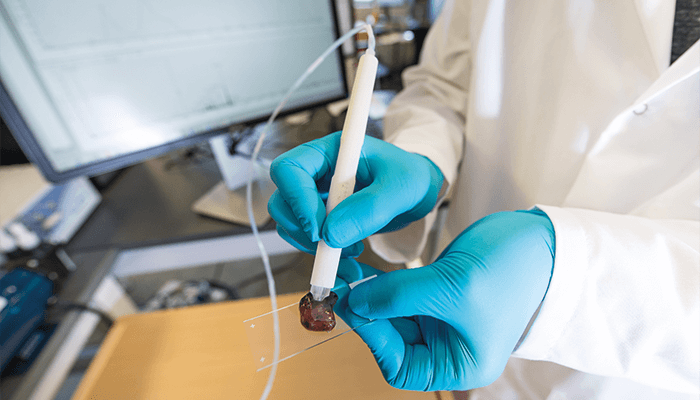
Meet the MasSpec Pen, a handheld mass spectrometry device with the potential to speed up accurate and intraoperative diagnosis of human cancer. The pen – which releases a water droplet onto suspected cancer tissue before drawing it back up for chemical analysis – was able to predict cancer with high sensitivity (96.4 percent), specificity (96.2 percent), and an overall accuracy of 96.3 percent (1). Finding and removing the edges of cancerous tissue by sight alone is a particular challenge for surgeons, and successful resection of all the cancerous tissue clearly has huge health implications for the patient. The resulting demand for precise, accurate and rapid detection has already inspired one similar device: the electrosurgical iKnife, which uses rapid evaporative ionization mass spectrometry (REIMS; see here).
The MasSpec Pen was conceived two years ago by Livia Schiavinato Eberlin, Assistant Professor, Department of Chemistry, University of Texas at Austin (notably, one of The Analytical Scientist’s Top 40 Under 40) – but for this small, yet seemingly mighty technology, it is only the beginning. “We are going to further validate the technology in my lab with larger sample sets and expand to other cancer types – then we’ll start testing in surgeries with our colleagues in the Texas Medical Center to compare our results with current results from clinical practice,” says Eberlin. “Next we should expand to larger clinical trials to really prove that the technology can improve surgical treatment and patient care.” Eberlin and team hope to be able to trial the device during operations within the next 12 months. Eberlin says it is very rewarding to work on a project with such high potential impact. “Since working with R. Graham Cooks during my PhD, the last 10 years of my career have been dedicated to translational and clinical research, and I am excited about the recent development of the MasSpec Pen,” she says. “I am very passionate about the field, and specifically about developing mass spectrometry technology that can make a real difference in clinical practice. My amazing research team and I have been working extremely hard on this project. It is amazing to see what they have accomplished so quickly!”
References
- J Zhang et al., “Nondestructive tissue analysis for ex vivo and in vivo cancer diagnosis using a handheld mass spectrometry system”, Sci Transl Med, 9, eaan3968 (2017).




